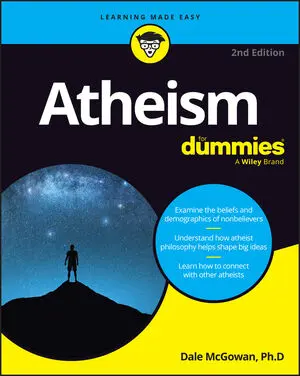This builtin is not currently supported: Animation
- Book & Article Categories

- Collections

- Custom Solutions
 Main Menu
Main MenuBook & Article Categories
 Main Menu
Main MenuBook & Article Categories
Dale McGowan
Dale McGowan, PhD, is the author of Atheism For Dummies, Parenting Beyond Belief and Raising Freethinkers and producer of podcasts on nonreligious parenting, mortality, wonder, and the human story. His work has appeared in The Huffington Post and The Washington Post, and he co-founded the secular media company OnlySky.
Articles & Books From Dale McGowan
An unintimidating guide to Atheism and secular philosophy Atheism For Dummies, 2nd Edition takes an unbiased look into the philosophical worldview of the lack of belief in gods. This approachable book showcases how atheism is a spectrum, from showing the secular values and lifestyles that resonate with many atheists to also showing how atheism can connect to other philosophical views such agnosticism, secular humanism, and more.
Cheat Sheet / Updated 09-22-2025
Atheism is the simple but kind of startling idea that no god or gods exist. If you’re interested in exploring the topic, it helps to know some of the labels for different types and degrees of religious doubt, some of the most important thinkers in the history of atheism, and a few of the most fascinating spots on Earth for just saying no to God.
Article / Updated 10-20-2023
Outraged by the role religion had played in keeping women in submission, many feminist leaders of the early Feminist movement identified as atheists and agnostics. Almost every traditional religion puts women in an inferior or even degraded role compared to men.Nearly all religions bar women from serving as clergy.
Article / Updated 03-26-2016
Atheism, humanism, and all the rest of the nontheistic isms show up in different ways around the world. What follows is a list of some of the most interesting places to watch for developments in religious disbelief.
Earth: Current home to 1.1 billion nontheistic people.
Ireland: Where those who call themselves “religious” dropped from 69 percent to 47 percent in seven years — the largest drop on Earth.
Article / Updated 03-26-2016
Atheism and other kinds of religious doubt are chock-a-block with labels and terms. Some are more important than others; some are neutral or positive; others are used (even by atheists) as putdowns. The following list includes all of the major labels — good, bad, and ugly.
Atheist: Doesn’t believe a god or gods exist.
Article / Updated 03-26-2016
The history of atheism is filled with important figures — people who have thought outside of the religious box of their times and often used their eloquence and intellect to convince other to do so as well. Some have also distinguished themselves as moral or intellectual heroes in the great issues of their day.
Article / Updated 03-26-2016
Science fiction writer Isaac Asimov calls the Bible “the most potent force for atheism ever conceived” — and many atheists agree. But most people are only familiar with that carefully handpicked sampler of inspiring passages from the Bible. For each and every inspirational passage that finds its way into pulpits and needlepoint pillows, half a dozen immoral horrors stay pretty well hidden.
Article / Updated 03-26-2016
From a country of atheist Lutherans to a province of atheist Catholics, there are some of interesting spots on the globe for religious disbelief. They also have different flavors of atheism.
Atheism in Scandinavia
Norway, Denmark, and Sweden are three of the four least religious countries on Earth, but you wouldn’t know that on the surface.
Article / Updated 03-26-2016
British atheist philosopher A.C. Grayling had an arresting thought about creating a Humanist Bible: How would world history have been different if the writers of the Bible used Greek and Roman philosophy instead of local religions as their sources? But they didn’t so Grayling did. The result is The Good Book: A Humanist Bible (Walker & Co.
Article / Updated 03-26-2016
Most religious believers want to live in a world in which people behave ethically. Funny thing…so do most atheists. An ethical society is simply safer, less scary, easier, more satisfying to live in, and simply better, whether or not a person believes in God. That’s the kind of place everyone want their kids to live in.




